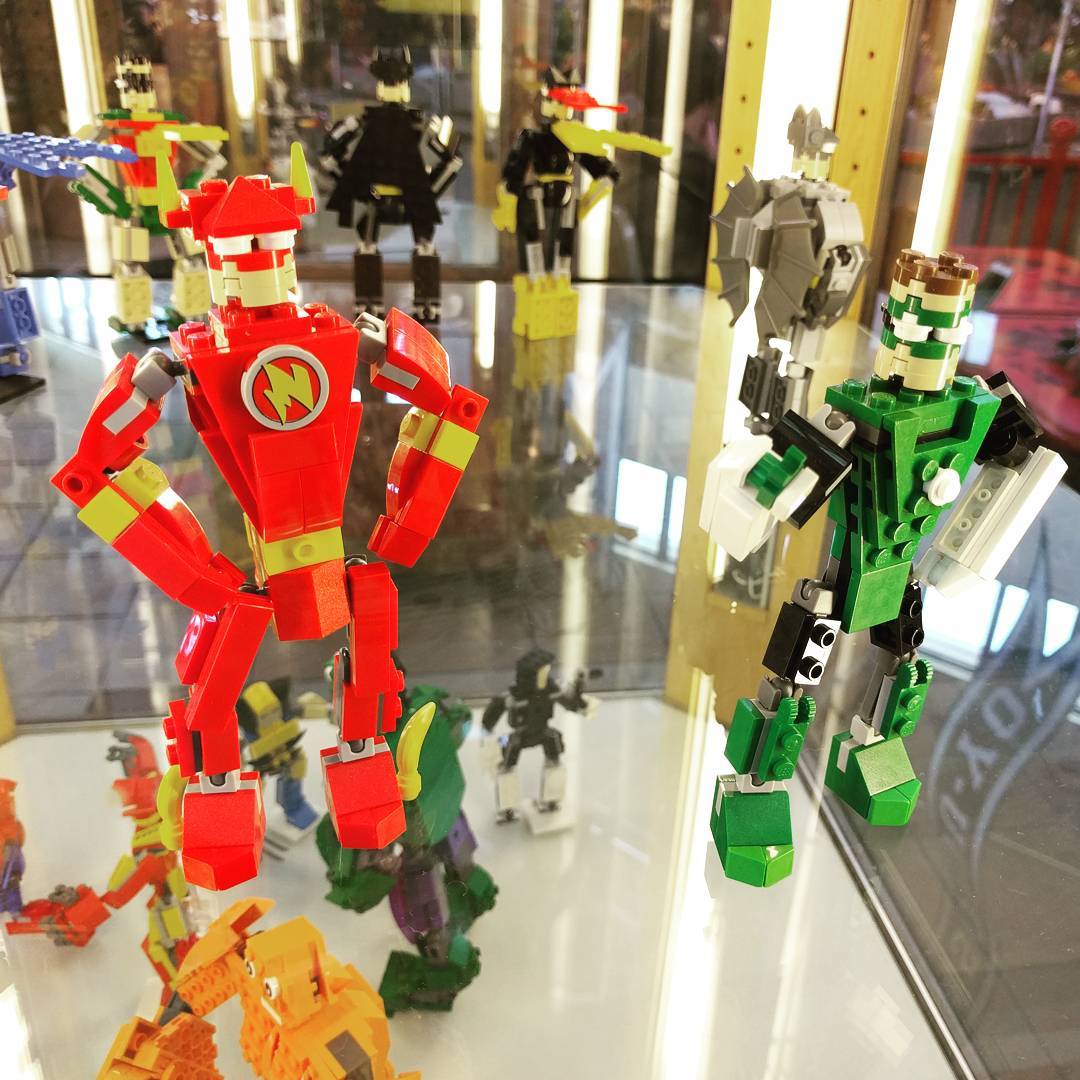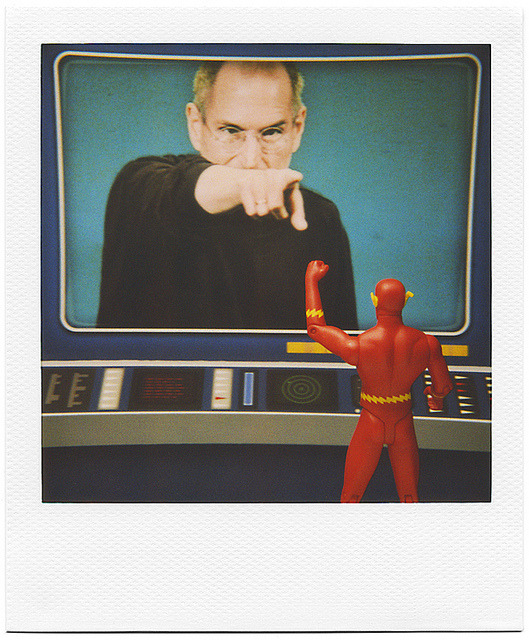
Tag: flash
LEGO Flash and Green by Matt Armstrong on display at LEGOLAND

You’re Goin’ Down!

speedforceorg:
You’re Goin’ Down! by tubes. on Flickr.
Adobe is killing Flash for mobile devices. Looks like Steve Jobs won.
Edited to add: Of course, the real reason you won’t see Flash on a mobile phone is that he can run across the state and tap you on the shoulder before your phone starts ringing.
Note: Follow-up to this post. TODO: add follow-up comments to original
Re: HYPERIUM
Trying to explain the Chain Lightning finale in terms of Hypertime
here goes:
First, an explanation in line with the basic many-worlds approach to time: When Wally changed the past, he could only go forward again in the timeline he had just created. This makes perfect sense when Wally’s the one making the changes, but it doesn’t explain why Cobalt Blue killing Barry changed history around Wally. (Similar problems apply to stories like Bart Saves the Universe.)
So, a Hypertime-based explanation: The Kingdom #2 described Hypertime as branching off of a “central timeline” or “main timeline,” i.e. the mainstream DCU. Given that DC has a long, well, history of stories in which time travelers change history, perhaps what’s going on is a realignment of which timeline is the “main” timeline.
It’s not totally consistent, but then neither is any other explanation. Personally, I think the DCU is too big and too complicated to ever hope for 100% consistency. With 60 years of stories (some of which have been officially removed from canon), hundreds or thousands of writers, artists, and editors, it’s sometimes amazing it’s as consistent as it is.
Re: Smallville vs. The Flash
I think it would be quite possible to keep the sense of history, and yet keep it simple enough that people can just tune in and understand what’s going on. Now, the example I’m going to give may have the advantage of working with a more well-known character than the Flash, but bear with me:
The Mask of Zorro.
In this movie, Antonio Banderas’ character becomes the new Zorro, taking over for Anthony Hopkins. By the end of the movie, Catherine Zeta-Jones is getting into the mask-and-sword act. Sure, people knew who Zorro was going into the film: a swordsman who wears a mask and fights injustice and oppression. The important details (his family and estates being taken from him, the vendetta against the man who took them, etc.) were (I believe) specific to this film, and were able to fit into a normal-length movie and still leave room for a plot.
So I can see a 2-hour pilot that sets up Barry Allen having been the Flash for however many years, and during the course of the story his nephew Wally West (in his late teens or early 20s), one of the few people to know his secret identity, is struck by lightning and gains similar powers. Barry starts training him, and by the end of the pilot he sacrifices his life to save the world (or at least some huge number of people) and Wally decides to carry on his mentor’s legacy.
If they wanted to, they could tie it into the previous series. It’s been about 10 years, they could get John Wesley Shipp to reprise his role as Barry for an episode, and state that Iris came back sometime after the end of the series. Or if they wanted to link Barry and Tina (there was some speculation), her original name could also have been West.
So it’s at least possible. Whether someone will be willing to try it remains to be seen.
Re: Flash Paradox
Actually, it’s not a paradox *yet,* just a loop. Confusing, but internally consistent. The main thing about a paradox is that it *isn’t* consistent – the old thing about going back in time to kill your grandfather, so you’d never be born to go back in time and kill him, so he’d still be alive, and so would you, and you’d go back in time…
Now a *real* paradox would be if, for some reason, John Fox *hadn’t* saved Iris… then Wally never would have gone to Central City and met the Flash, and you have either the Flash line ending with Barry or being picked up by someone else… who might have found a different solution to Mota (50th Anniversary Special) that wouldn’t have left him slowly turning into Radioactive Man over 700 years to reappear in John Fox’s time and lead to his gaining super-speed.
Hmmm… if that happened, then he wouldn’t even have the *chance* to help rescue Iris, and that future would remain intact. So I guess it technically wouldn’t be a paradox either. Aargh!
No wonder Wally gets a headache whenever he deals with time travel!
Re: Flash#164 jay garrick
In my opinion, to be considered a “Hypertime story,” it would have to make use of some facet of Hypertime that cannot already be explained by traditional understanding of time travel. Even if what’s really going when you change the past is the splitting off of a new hypertimeline, you can still interpret it as an alteration of a single timeline. After all, under most circumstances the time traveler has no way of breaking out of the timeline he creates – as far as he can tell, there *is* only one timeline.
One of my favorite quotes about scientific paradigms is “You can’t build a bridge with Relativity.” Gravity is a relativistic effect (or a quantum effect), but if you try to use relativity or quantum mechanical equations to design a bridge, you’ll never accomplish anything. You build a bridge with Newtonian physics, even though the underlying causes of the stresses that you’re trying to distribute are relativistic or quantum in origin. You can argue that a bridge is not a quantum object, because it doesn’t matter whether the electrons in its molecules are in clouds, orbitals, or tiny cardboard boxes.
So if a story confines itself to the main DCU timeline and could be told without knowledge or existence of Hypertime (just as we’ve been building bridges for centuries without knowledge of relativity, quantum physics, or whatever the next paradigm is that will come along), I think it can safely be considered “not a Hypertime story” in the same way that a bridge doesn’t involve relativity.
It’s possible to interpret any time travel story within the realm of Hypertime – I went to a great deal of trouble to figure out how Chronos, Team Titans, Armageddon 2001, Zero Hour, Bart Saves the Universe, Crisis and other stories could fit within Hypertime – but I would argue that none of these stories were Hypertime stories, because they could all be told within a traditional time-travel or multiverse framework. (I even had someone complain of this when I originally posted the Hypertime article on my site, which was why it was quickly retitled “Time and Hypertime.”).
If “Wonderland” turns out to use classical time travel without
branching, crossing, or mingling timelines, then it doesn’t use anything that is uniquely Hypertime. If it does, we can call the writer on it. Otherwise, it’s like calling “The Fugitive” a story about DNA. Yes, both pursuer and pursued have it, but it’s irrelevant to the actual story, which could just as easily be told about humanoid silicon-based lifeforms or sentient robots with only a few changes in dialog and none to the plot or setting.
—
That’s the whole point. As an engineer, you don’t need to know all the hardcore physics details. When you build a bridge, it’s an engineering process, and all you need to deal with are things like gravity, wind, strength and elasticity of the material, etc. All that other stuff, even though it’s going on at subatomic level, is irrelevant to the bridge. In the same way, I see the underlying structure of Hypertime as being irrelevant to a plain time travel story, unless it involves something that can only be explained with Hypertime.
Re: The Flash #163: or about how can REALLY anyone beat The Flash
I like the idea of Wally’s attention span – even at super-speed (I think someone once said he isn’t actually impatient, it’s just that things happen more slowly for us than they do for him) – as a limiting factor. As Ex-Speed McGee (or was it Mason?) once said, super-speed doesn’t help if you don’t see it coming.
Re: Hypertime again or not?
The way I look at the overlapping aspect is to think of hypertime as a network of rivers. They all flow in the same direction, but sometimes they diverge and reconnect (such as when there’s an island in the middle of the river). A particular timeline is the path each water molecule takes as it goes from one part of the river to another. Many of these paths will cross each other and overlap, and the molecules themselves will knock into each other, influencing the paths they take.
It’s the idea of the “timestream” taken a step further.
Why I don’t want to see Savitar again…
I noticed a lot of you seem to want Savitar to come back. I don’t. Not because he wasn’t a great villain, but because he *was* – and because bringing him back from the dead would cheapen that death and the sacrifice Wally almost made. Likewise, bringing back Barry or Zoom permanently would cheapen Barry’s sacrifice and the tragedy of Zoom’s death (and all the grief Barry went through during his trial). I don’t know how many of you read The Titans currently, but I remember an issue where Starfire is showing Damage and Argent around their HQ and shows them the gallery of fallen Titans – Jericho, Kole, Golden Eagle, etc. “They all came back, right?” one of them (prob. Argent) asks. “I mean they *were* Titans…” And Starfire says, “You *do* know that when people die, they usually don’t come back, right?”
When someone comes back within one story, it makes sense. Terminal Velocity was like that. As someone said on another board, you start with the warning that “no one has ever gone into the Cave of Death and come back alive!” and you know instantly the story has to be about the one person who does come back. It ends up being like Orpheus’ descent into the underworld and his return. Or to pick a more modern example, Sheridan’s death on Z’ha’dum in Babylon 5. But Orpheus only went to the Underworld once, and Sheridan never returned to Z’ha’dum. Wally’s been “lost in the speed force” 3 times so far, and he’s come back every time. He even dove into it to rescue Linda during the Black Flash story. The threat’s gone. I didn’t even take it seriously this last time, at the end of Chain Lightning.
To go back to the Titans for a bit, they were formed to battle Trigon the Terrible, the demonic conqueror of another dimension who had set his sights on ours and who was Raven’s father. They barely defeated him once, and then in the second storyline he was “destroyed forever” by the spirits of the Azarathians. Great story, great conclusion, and we move on. 80 issues later, they do the Dark Raven storyline, and by the end of the series, Trigon is back just long enough to be “destroyed forever” AGAIN. How many times can you destroy someone forever? It makes the original victory hollow.
Resurrection only works for a limited pool of characters (Resurrection Man, Ras al Ghul, maybe a few others), and even then it has to have serious consequences (such as the death of Morpheus the Sandman and his replacement with Daniel – another facet of Dream, but a different persona from the one we’d come to know.)
Re: Why do you like THE FLASH?
The first comic I really collected was the New Teen Titans, and the first storyline I read was the second Trigon story (at the beginning of the deluxe series). So I’d read about Wally as Kid Flash (he had a prominent role in that story) there and in Crisis, so I thought I’d pick up the Flash. What I liked the most, especially early on, is that you have here an ordinary guy who’s a super-hero. He’s not billionaire Bruce Wayne, he’s not from another planet, he’s this regular guy who has powers, but has to deal with everyday problems like his parents, his girlfriend(s), his rent, etc. After that it was watching him slowly come out of Barry’s shadow, and in the last few years the core of the book has been his relationship with Linda – again, not a storybook one, but a real one, where they disagree, they argue, and they have to deal with how they differ just as much as with how they’re similar. The other key this series has is its focus on the Flash legacy. There are very few series where the hero’s predecessors are as important as Jay, Barry, and even Max and Johnny are with Flash – there’s the two present holders (Wally and Jesse) and the future in Bart and, to some degree, in Iris West II (whether she’s part of the “main” timeline or not)
That said, I do miss a lot of the older supporting characters. Mason, Tina and Jerry, even Chunk and Argus.
Re: Impulse Cancellation
I’m not sure if it applies here as well, but in campaigns to keep TV shows on the air they always have some recommendations:
- letters on paper are always given more weight than email. 100 emails could come from one person with a mail bot, but chances are that 100 letters were sent by 100 different people (since you’d have to spend $33 on stamps – and never mind international postage)
- If you can write legibly, it’s better to write it by hand in blue pen. That way they know for sure it’s not a photocopied form letter.
- Keep it short and to the point. Maybe two paragraphs, and start out by telling them that you like Impulse and don’t want to see it cancelled. You can go on to say why you like the series, but don’t go on for pages extolling its philosophical implications. They probably won’t read anything that long.
- Don’t send it to the Impulse lettercol – if it was their decision, the series wouldn’t be in danger. You want to send your “please don’t cancel the series” to the higher-ups at DC. The lettercol is the place for your philosophical treatise.
Anyone want to organize a letter-writing campaign? I don’t have the time to run it myself, but if someone else wants to run it, I’d be happy to put up a link to the info if you want to put it on your own site, or you can send me a page and I’ll put it on my own server. I get enough hits on my site that it’ll be a good gateway to get people to notice it.
Names
Found these on BehindTheName.com
WALLACE (m) “Welsh” or “foreigner” (French). Sir William Wallace was the Scottish hero who briefly expelled the rule of England from Scotland in the 13th century.
WALTER (m) “rule people” or “rule army” (Teutonic). Composed of the elements wald “rule” combined with either heri “army” or harja “people”. Sir Walter Scott was an novelist from Scotland, the author of ‘Ivanhoe’.
WALLY (m,f) Short form of WALTER or WALLACE (masculine), or VALESKA (feminine).
LINDA (f) “beautiful” (Spanish) or short form of BELINDA or MELINDA. It can also mean “snake” or “serpent” from Teutonic linde. The serpent signified wisdom in Teutonic legend.
ANGELA (f) “messenger” from the Greek word angelos.
I especially like the contrast between Wallace (who felt like an outcast in his own family) and Walter (who is the more ruthless of the two). “Linda” representing wisdom fits with what Wally said about her teaching him everything he knows about being an adult. Angela as a messenger, though… that’s an interesting idea.
Super-Speed Perceptions
Replying to Minyon’s post:
has anyone ever wondered how he staves off the boredom. I mean at the speed he processes information, a normal conversation would seem to take forever. I actually remeber a story in one of the annuals where the whole thing took place from Wally’s POV, and the entire story was resolved in the time it took for an elevator to fall 2 floors. Normal life must be a real DRAG for the man.
Wally’s perceptions have changed from time to time. In the first issue, he runs several miles past Vandal Savage before the image even registers on his retina – which doesn’t make sense, because if that were true, how could he possibly run around things and dodge obstacles? Then in #30, there’s another story from Wally’s super-speed perspective. He and Connie go to a movie, and everything is taking place in normal speed, when suddenly the picture stops on one frame, and everyone in the theater (including Connie) freezes. He can’t figure out what’s going on, until he notices a pressure at the back of his neck. he turns around, and there’s a bullet hanging in mid-air. Suddenly he realizes his speed has reflexively switched on, and he goes around the theater looking for other bullets and stopping them before they actually hit anyone. He notices after a while that the picture’s moved to another frame (though realistically, the screen should’ve gone dark between frames), and decides he’d better hurry up. Once he’s confident he’s caught all the bullets, he goes over to the gunman and switches his perceptions back to normal speed (at which point a bullet he missed hits the exit sign). So at as far as William Messner-Loebs was concerned, Wally could switch from normal to hyper-speed perspective at will.
That elevator story– does anyone remember which annual it was in?